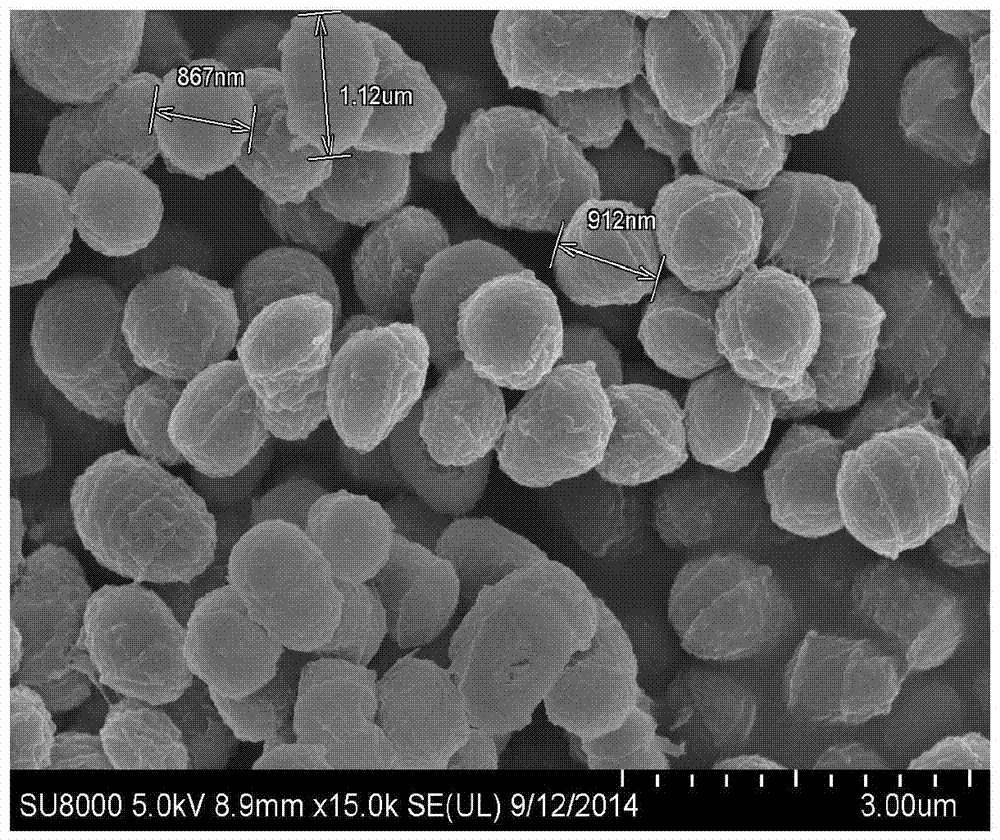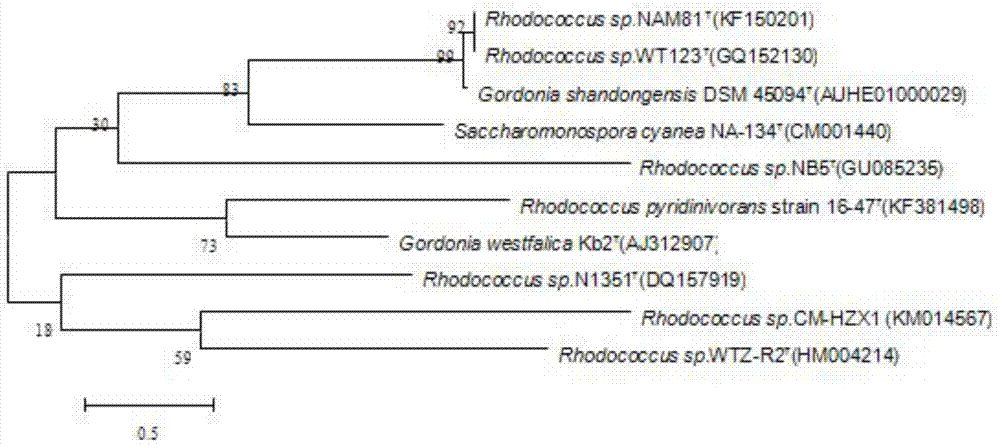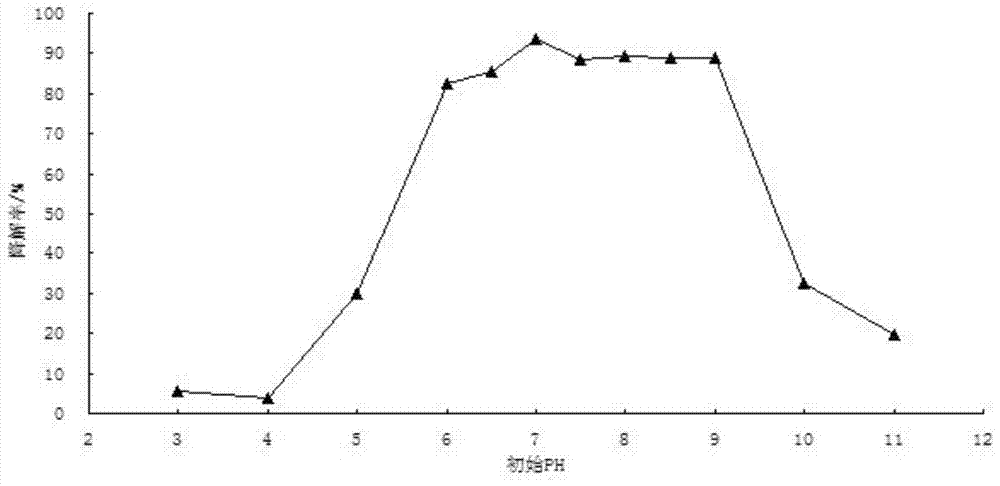Rhodococcus strains and their applications
A technology of rhodococcus and strains, applied to bacteria, fixed on/in organic carriers, water/sludge/sewage treatment, etc., can solve the problems of low phenolic concentration tolerance, low degradation rate, and constraints, Achieve the effect of strong adaptability and broad application prospects
- Summary
- Abstract
- Description
- Claims
- Application Information
AI Technical Summary
Problems solved by technology
Method used
Image
Examples
Embodiment 1
[0033] Example 1 Isolation and identification of Rhodococcus sp. CM-HZX1
[0034] 1. Isolation of Rhodococcus sp. CM-HZX1
[0035] Rhodococcus sp. CM-HZX1 was isolated from the activated sludge in the aerobic tank of Huzhou sewage treatment plant.
[0036] (1) culture medium
[0037] Enrichment medium: yeast powder 5g, peptone 10g, NaCl 10g, add distilled water to make up to 1000mL, pH: 7.0-7.2, sterilize at 121°C for 20 minutes.
[0038] Inorganic salt medium: (NH 4 ) 2 SO 4 : 1g / L, CaCl 2 : 0.1g / L, K 2 HPO 4 : 0.5g / L, KH 2 PO 4 : 0.5g / L, MgSO 4 : 0.5g / L, NaCl: 1g / L, a certain amount of phenol, constant volume with phenol-free distilled water, pH: 7.0~7.2, sterilized at 121°C for 20 minutes.
[0039] Solid medium: add 1.5-2% agar to the above liquid medium components.
[0040] (2) Isolation and purification of bacterial strains
[0041] Take 10g of activated sludge and inoculate it into 100ml enriched medium with a phenol concentration of 100mg / L, shake it on a sha...
Embodiment 2
[0062] The best growth condition optimization of embodiment 2 Rhodococcus (Rhodococcus sp.) CM-HZX1
[0063] Medium: (NH 4 ) 2 SO 4 : 1g / L, CaCl 2 : 0.1g / L, K 2 HPO 4 : 0.5g / L, KH 2 PO 4 : 0.5g / L, MgSO 4 : 0.5g / L, NaCl: 1g / L, a certain amount of phenol, constant volume with phenol-free distilled water, pH: 7.0~7.2.
[0064] (1) Effect of the initial pH value of the medium on the degradation efficiency of phenol by Rhodococcus sp. CM-HZX1
[0065] By changing the pH value in the medium, the influence of the initial pH on the degradation efficiency of phenol by Rhodococcus sp. CM-HZX1 was investigated. Prepare 300 mL of phenol culture medium with a concentration of 500 mg / L, and the transfer volume is about 15%. Centrifuge the sludge and add it to the phenol culture medium with a pH of 3-11. For blank comparison, under the conditions of 30°C and 150r / min shaker culture, the supernatant was centrifuged for a certain period of time and the value of volatile phenol was de...
Embodiment 3
[0073] The salt resistance of the Rhodococcus strain of embodiment 3 degrading phenol
[0074] In complex industrial phenol-containing wastewater, the salt content is relatively high. By changing the salt content in the medium, the salt-resistant ability of Rhodococcus strains that degrade phenol was investigated. Prepare a phenol culture medium with a concentration of about 500mg / L, and transfer the volume to about 15%. Centrifuge the sludge and add it to the phenol culture medium. The initial pH value is 7. Cultivate in a shaker at 30°C and 150r / min, with a certain period of time. , and centrifuged to get the supernatant to detect the value of volatile phenol by direct spectrophotometry with 4-aminoantipyrine.
[0075] Depend on Image 6 It can be seen that when the salt content of the strain of the present invention is 0.5-4%, the phenol degradation rate is about 90%, indicating that the microorganism belongs to moderate salt-tolerant microorganism.
PUM
| Property | Measurement | Unit |
|---|---|---|
| diameter | aaaaa | aaaaa |
| diameter | aaaaa | aaaaa |
Abstract
Description
Claims
Application Information
 Login to View More
Login to View More - R&D
- Intellectual Property
- Life Sciences
- Materials
- Tech Scout
- Unparalleled Data Quality
- Higher Quality Content
- 60% Fewer Hallucinations
Browse by: Latest US Patents, China's latest patents, Technical Efficacy Thesaurus, Application Domain, Technology Topic, Popular Technical Reports.
© 2025 PatSnap. All rights reserved.Legal|Privacy policy|Modern Slavery Act Transparency Statement|Sitemap|About US| Contact US: help@patsnap.com



